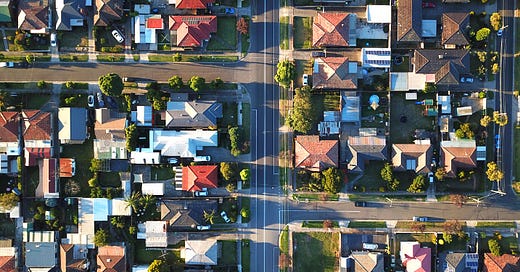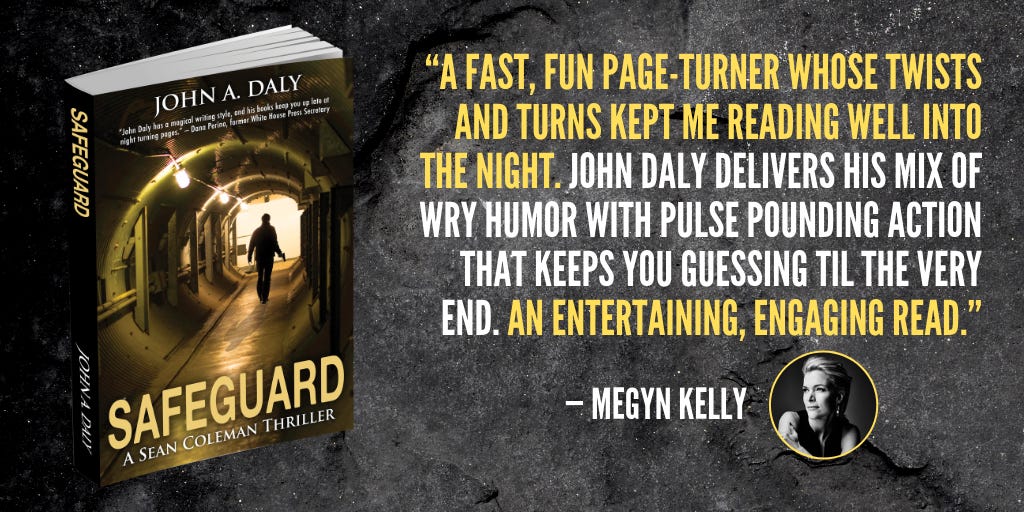
I’ll begin this column by thanking some readers who noticed that I didn’t put out a piece last week, and were wondering if my family and I were doing okay during this health crisis.
The answer is yes… or so we assume. So far, the Dalys have only experienced the occasional phantom symptom — one of those brief onsets of a dry throat, cough, or peculiar ache that half-convinces us that things are about to get crazy...before it just sort of disappears on its own. I'm sure we're not the only ones who've gone through this exercise over the past several days.
The reason I didn’t write anything last week (including for my next book) is that it was my children’s spring break. We wanted to do some fun things together as a family, even though our choices were limited by mass closures and social distancing. This included playing games (including a Lego competition that I’m pretty sure I won), watching movies, going on some hikes, and building up some driving hours for my 15-year-old son.
The latter was particularly productive, being that the roads are less traveled than usual, and the small-town destinations we hit — even in normal times — aren’t exactly overflowing with people:
But like lots of others right now, most of our time has been spent at home (where we’ll all be working or doing school work for at least the next month), and truth be told, we’ve probably been more cautious than most people.
For readers who’ve been with me a while, you may remember that my aforementioned son had major spine surgery a couple years ago to fix his scoliosis. Though the surgery was a major success, the damage previously caused by his curved spine left him with some permanently diminished lung capacity. So, while young people are faring this virus better than anyone, we’d rather not put our young person, who has one of those existing conditions we’ve been hearing about, to the test.
For us it adds an extra level of anxiety to this very anxious time in world history, but there are plenty of others who are already dealing with the direct results of the coronavirus. I’m talking about the infected, some of whom are currently fighting for their lives. I’m talking about the families of those who are suffering or have already lost their lives. And I’m talking about the heroic medical workers who are placing their own health at risk every day to treat patients in overcrowded, chaotic environments; we owe them a debt of gratitude that we’ll never be able to pay.
There are also those suffering indirectly from the coronavirus — victims of the incremental shutdown of economic sectors across the globe: the business owners who can’t afford to close down operations, even for a week or two; the workers who are sitting at home or filing for unemployment while their bills begin to pile up; the workers who are having to perform their jobs in risky environments; and those who were about to retire but now can’t.
The economic impact is nothing short of devastating, and things will continue to get worse before they get better. But top medical professionals and the statistics they present make it clear that until we get the spread of this highly contagious disease on a downward slope, the lives of our people and the viability of our medical institutions must be our top concern. In the meantime, we must plan, as Yuval Levin puts it, for a “soft start” following this “hard pause.”
Along with the anxiety and the suffering is anger. And there are plenty of people to be angry at.
First and foremost is the Chinese government, whose extensive cover-up of the seriousness of the disease and its rapid spread led to this global pandemic. According to a study from the University of Southampton, early intervention by Chinese authorities could have reduced the number of infected by as much as 95%. And they continue to suppress information and even rewrite history by suggesting that the disease originated here in America. China will have to face some serious, international consequences for what they've done.
Bureaucratic failures in our federal institutions and response procedures will also come under sharp scrutiny once this crisis is over. The CDC came out of the gate very slowly, especially in regard to testing. Our country lagged behind several others (and still does on some fronts), and that cost us valuable time in our efforts to contain and mitigate the virus here within our borders.
Then, there are our political leaders...
Only now, as Congress works with the president on a massive stimulus package, are we recognizing (“remembering” is perhaps the better word) how breathtakingly irresponsible it was to run up huge federal deficits, on top of an already enormous national debt, during a time of economic expansion. Fiscal conservatives (what few are left) had it right; the tribes had it wrong.
In regard to the president, his loyalists will make excuses and tout his leadership all day long, but the truth is that he and his conservative-media echo chamber rhetorically downplayed the threat for weeks. While some good moves were made on travel restrictions, Trump and his minions essentially repeated China’s propagandist, politically helpful picture of what was happening instead of conveying what the top scientists and medical professionals in the world (including those in Trump's own administration) were saying both privately and publicly. This needlessly fueled conspiracy-driven beliefs that the threat of a global pandemic was a political or media concoction — a sentiment that sadly and dangerously still exists despite the clear reality of the situation.
Even now that Trump has accepted the pandemic for what it is, recently referring to himself as a “war-time president,” he has continued to overstate and over-promise remedies and timelines that people like Dr. Tony Fauci, in the interest of public safety and candor, have repeatedly had to correct the record on (sometimes just minutes later). Conflicting messages at a time like this do not instill trust in our government. And right now, we need to be able to trust our leaders.
Our elected representatives on the left, at least at the federal level, have disgraced themselves well. Taking a page out of Rahm “Never allow a crisis to go to waste” Emanuel’s playbook, congressional Democrats have been delaying the coronavirus relief bill with all sorts of non-coronavrius demands, including collective bargaining powers for unions, increased fuel emission standards for airlines, the expansion of solar and wind tax credits, and Planned Parenthood funding. It’s as if they don’t understand or care about the incredibly serious situation at hand. This is a global pandemic, not a Christmas party.
And of course, the liberal media (who've been handling this better than many on the right are willing to give them credit for) are cheapening their coverage by latching on to stupid things. This includes the perceived political incorrectness of labeling the coronavirus after its country of origin, and blaming the president for the death of a man who foolishly ingested fish tank cleaner, because it contained an ingredient that Trump has been promoting (in its medication form) as a possible deterrent against coronavirus symptoms.
It’s all pretty maddening, but anger isn’t going to solve much right now. It's best that we look forward. And in looking forward, perhaps we also need to narrow our view.
Honestly, at this point in this crisis, I think it’s best that people limit their news intake to maybe a half-hour each day, and perhaps just watch their local news channels instead of the national networks (especially the cable news networks). You’re going to get the same amount of pertinent information locally without all the obsessive, partisan nonsense. And frankly, state governors seem to have as good of a handle on managing this crisis as anyone. Their press conferences have been much more productive than anything I’m seeing at the federal level, and that includes the far-left governor of my own state who I don't agree with, politically, on anything.
For now, just for the state of minds, I’d suggest that people focus on keeping themselves and those they care about safe (which in some cases means staying away from them), helping out the small businesses in their community (by buying gift cards, carry-out food, etc.), and — if possible — maybe even picking up some new interests or hobbies.
We're going through a very hard time right now. Surrounding ourselves with noise for hours on end isn't going to make it any easier.
—













